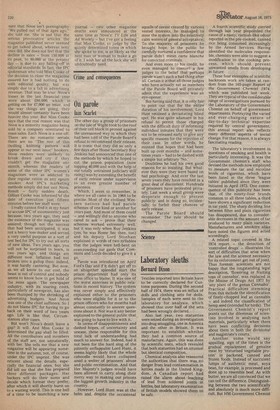Crime and consequences
On parole
lam Scarlet
The other day a group of prisoners on the Isle of Wight took to the roof of their cell block in protest against the unreasoned way in which they had been told of the Parole Board's refusal to recommend their release. It is ironic that they did so only a few days after Home Secretary Roy Jenkins had announced that one of the methods by which he hoped to cut the prison population (now topping 40,000 and with the help of our totally untrained judiciary still' rising) was by extending the benefit of early release under supervision to an even greater number of prisoners.
Which, I seem to remember, is where we all came in. In 1968 to be precise. Most of the civilised Western nations had had parole schemes of one kind or another for years past. And most of them could and willingly did to anyone who cared to ask — prove that their schemes worked extremely well.' but it was only when Roy Jenkins (yes, he was Home Sec then, too) and his deputy Lord Stonham explained in words of two syllables that the judges were hell-bent on overcrowding our gaols that Commons and Lords decided to give it a go.
Parole was introduced on April Fool's Day and if it didn't get off to an altogether splendid start the prison department had only its press office to blame. It was one of the worst exercises in public relations in recent history. The system was never simply and effectively explained either to the prisoners who were eligible for it or to the prison officers who for months had almost constantly to answer questions about it. Nor was it any better explained to the general public that _ was going to have to live with it.
In terms of disappointments and dashed hopes, of uncertainty and unease, those responsible for this total lack of understanding had much to answer for. Indeed, had it not been for the hard slog of the patently unflappable Lord Hunt, it seems highly likely that the whole caboodle would have collapsed amid a welter of prisoners' abuse and public recrimination. And that Her Majesty's judges would have been allowed to carry along their merry way to making our prisons the biggest growth industry in the country.
However, Lord Hunt was at the helm and, despite the occasional squalls of unrest created by various vested interests, he managed to steer the system into the relatively calm waters of general acceptance. To the majority of prisoners he brought hope. In the public he carefully nurtured a confidence that parole didn't mean carte blanche for convicted criminals.
And even more to his credit, he even managed to convert a few judges to the belief that perhaps parole wasn't such a bad thing after all. Certain it is that all those judges who have actually sat as members of the Parole Board will privately admit that the experience was an eye-opener.
But having said that, it is only fair to point out that for the ehtire .duration of his involvement,. Lord ffunt retained a devastating blind spot. He was quite adamant in his refusal to permit those charged with the difficult duty of informing individual inmates that they were not to be released early to give any specific reasons for the rejection of their case. In other words, he insisted that hopes that had been built up over months — and sometimes years — had to be dashed with a simple but arbitrary `No.'
Doubtless he had his own good reasons for so insisting. But whatever they were they were based on bad psychology. And over the last seven years they have resulted in a great deal of discontent. Hundreds of prisoners have protested privately. Last week a small group were desperate enough to protest publicly: and in doing so, incidentally, to forfeit their chances of early release.
The Parole Board should reconsider. The rule should be changed.


































 Previous page
Previous page